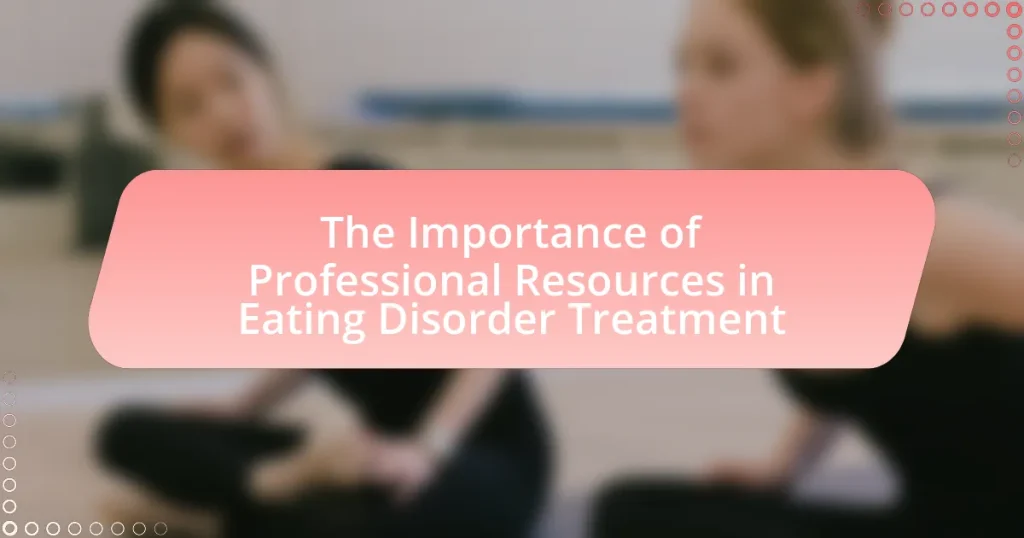The article focuses on the critical role of professional resources in the treatment of eating disorders, highlighting the importance of licensed healthcare providers such as psychologists, psychiatrists, dietitians, and medical doctors. It discusses how a multidisciplinary approach, combining therapy, nutritional counseling, and medical care, significantly improves recovery outcomes for conditions like anorexia nervosa and bulimia nervosa. The article also examines the collaboration among professionals, the significance of access to these resources for effective treatment and relapse prevention, and the various types of professionals involved in the treatment process. Additionally, it addresses barriers to accessing care and strategies for individuals to find the right professionals, emphasizing the necessity of structured support in achieving long-term recovery.

What are Professional Resources in Eating Disorder Treatment?
Professional resources in eating disorder treatment include licensed healthcare providers such as psychologists, psychiatrists, dietitians, and medical doctors who specialize in the diagnosis and treatment of eating disorders. These professionals utilize evidence-based practices to address the psychological, nutritional, and medical aspects of eating disorders. For instance, the National Eating Disorders Association emphasizes the importance of a multidisciplinary approach, which combines therapy, nutritional counseling, and medical care to effectively treat conditions like anorexia nervosa and bulimia nervosa. Research indicates that comprehensive treatment involving these professional resources significantly improves recovery outcomes, highlighting their critical role in the healing process.
How do professional resources contribute to effective treatment?
Professional resources significantly enhance effective treatment by providing specialized knowledge, skills, and support tailored to individual needs. These resources, including licensed therapists, dietitians, and medical professionals, ensure comprehensive care that addresses both psychological and physical aspects of eating disorders. For instance, research published in the “International Journal of Eating Disorders” highlights that multidisciplinary teams improve treatment outcomes by integrating various therapeutic approaches, leading to higher recovery rates. Additionally, access to evidence-based practices and ongoing professional training allows these resources to stay updated on the latest treatment methodologies, further contributing to the effectiveness of care provided to individuals with eating disorders.
What types of professionals are involved in eating disorder treatment?
Various professionals are involved in eating disorder treatment, including psychiatrists, psychologists, dietitians, and medical doctors. Psychiatrists provide medication management and psychiatric evaluations, while psychologists offer therapy and counseling to address underlying psychological issues. Dietitians specialize in nutritional education and meal planning tailored to the individual’s needs. Medical doctors monitor physical health and manage any medical complications arising from the eating disorder. This multidisciplinary approach is essential for effective treatment, as it addresses both the psychological and physical aspects of eating disorders.
How do these professionals collaborate in treatment plans?
Professionals collaborate in treatment plans for eating disorders through interdisciplinary communication and coordinated care strategies. This collaboration typically involves dietitians, therapists, and medical doctors who regularly share patient progress and treatment goals during meetings or through shared electronic health records. Research indicates that integrated treatment approaches, where professionals work together, lead to improved patient outcomes, as evidenced by a study published in the Journal of Eating Disorders, which found that patients receiving coordinated care had a 30% higher recovery rate compared to those receiving fragmented services.
Why is access to professional resources crucial for recovery?
Access to professional resources is crucial for recovery because they provide specialized knowledge, support, and treatment options that are essential for addressing the complexities of eating disorders. Professional resources, such as therapists, dietitians, and medical professionals, offer evidence-based interventions tailored to individual needs, which significantly enhance the likelihood of successful recovery. Research indicates that individuals who engage with professional treatment are more likely to achieve long-term recovery outcomes; for instance, a study published in the Journal of Eating Disorders found that structured treatment programs led to a 50% improvement in recovery rates compared to those who did not seek professional help. This underscores the importance of professional resources in facilitating effective recovery pathways.
What role do professional resources play in preventing relapse?
Professional resources play a critical role in preventing relapse by providing structured support, evidence-based treatment, and ongoing monitoring for individuals recovering from eating disorders. These resources, which include therapists, dietitians, and support groups, help individuals develop coping strategies, address underlying psychological issues, and maintain accountability throughout their recovery journey. Research indicates that access to professional support significantly reduces the likelihood of relapse; for instance, a study published in the Journal of Eating Disorders found that individuals receiving regular therapy and nutritional counseling had a relapse rate of only 20%, compared to 50% for those without such support. This underscores the importance of professional resources in fostering long-term recovery and stability.
How do professional resources enhance the overall treatment experience?
Professional resources enhance the overall treatment experience by providing specialized knowledge, support, and structured interventions tailored to individual needs. These resources, such as licensed therapists, nutritionists, and medical professionals, contribute to a comprehensive treatment plan that addresses the multifaceted nature of eating disorders. Research indicates that multidisciplinary approaches, which include input from various professionals, lead to better patient outcomes, as evidenced by a study published in the Journal of Eating Disorders, which found that patients receiving coordinated care from a team of specialists showed significant improvements in recovery rates compared to those receiving fragmented care.

What are the Different Types of Professional Resources Available?
The different types of professional resources available for eating disorder treatment include therapists, dietitians, medical doctors, support groups, and online resources. Therapists, such as psychologists and counselors, provide mental health support and therapy tailored to eating disorders. Registered dietitians specialize in nutrition and help create meal plans that promote recovery. Medical doctors, including psychiatrists, can prescribe medications and monitor physical health. Support groups offer community and shared experiences, which can be beneficial for individuals in recovery. Online resources, such as telehealth services and educational websites, provide accessible information and support. These resources collectively contribute to a comprehensive approach to treating eating disorders, as evidenced by studies showing that multidisciplinary treatment improves recovery outcomes.
What are the roles of therapists in eating disorder treatment?
Therapists play a crucial role in eating disorder treatment by providing psychological support, developing treatment plans, and facilitating behavioral change. They assess the individual’s mental health, identify underlying issues related to the eating disorder, and create tailored therapeutic approaches, such as cognitive-behavioral therapy (CBT), which has been shown to be effective in treating conditions like anorexia and bulimia. Additionally, therapists help clients build coping strategies, improve self-esteem, and address body image concerns, which are essential for recovery. Research indicates that therapy significantly increases the likelihood of positive outcomes in eating disorder treatment, highlighting the importance of professional intervention in this complex area of mental health.
How do different therapeutic approaches address eating disorders?
Different therapeutic approaches address eating disorders through tailored interventions that target the psychological, emotional, and behavioral aspects of these conditions. Cognitive Behavioral Therapy (CBT) focuses on changing negative thought patterns and behaviors associated with eating disorders, demonstrating effectiveness in reducing symptoms and promoting healthier eating habits. Family-Based Therapy (FBT) involves the family in the treatment process, particularly for adolescents, and has shown success in restoring healthy eating patterns and weight. Dialectical Behavior Therapy (DBT) addresses emotional regulation and interpersonal effectiveness, which can be beneficial for individuals with co-occurring disorders. Research indicates that these approaches, when applied appropriately, significantly improve recovery rates and overall mental health outcomes for individuals suffering from eating disorders.
What qualifications should therapists have for effective treatment?
Therapists should have a master’s or doctoral degree in psychology, counseling, or social work for effective treatment. This educational background ensures they possess the necessary theoretical knowledge and practical skills to address complex mental health issues, including eating disorders. Additionally, therapists should be licensed by relevant state boards, which typically requires supervised clinical experience and passing a licensing exam. Research indicates that licensed professionals are more effective in delivering treatment, as they adhere to established ethical standards and best practices in mental health care. Furthermore, specialized training in eating disorders, such as certifications from recognized organizations, enhances their ability to provide targeted interventions, improving treatment outcomes for clients.
What is the significance of nutritionists in the treatment process?
Nutritionists play a crucial role in the treatment process of eating disorders by providing specialized dietary guidance and support tailored to individual needs. Their expertise helps patients understand the nutritional aspects of their conditions, enabling them to make informed food choices that promote recovery. Research indicates that nutritionists contribute to improved treatment outcomes by addressing nutritional deficiencies and educating patients about balanced eating habits, which are essential for physical and mental health. For instance, a study published in the Journal of Eating Disorders found that patients receiving nutritional counseling alongside traditional therapy showed significantly better recovery rates compared to those who did not.
How do nutritionists tailor meal plans for individuals?
Nutritionists tailor meal plans for individuals by assessing personal health needs, dietary preferences, and lifestyle factors. They begin with a comprehensive evaluation that includes medical history, nutritional status, and specific goals, such as weight management or addressing health conditions. This personalized approach ensures that the meal plans are not only nutritionally balanced but also sustainable and enjoyable for the individual. Research indicates that individualized meal planning significantly improves adherence to dietary recommendations, which is crucial in the context of eating disorder treatment, as it fosters a healthier relationship with food and supports recovery.
What educational resources do nutritionists provide to patients?
Nutritionists provide a variety of educational resources to patients, including personalized meal plans, nutritional guidelines, and information on food labels. These resources are designed to help patients understand their dietary needs and make informed food choices. For instance, personalized meal plans take into account individual health conditions, preferences, and goals, ensuring that patients receive tailored advice. Additionally, nutritionists often educate patients about the importance of macronutrients and micronutrients, which can enhance their understanding of balanced diets. Research indicates that effective nutritional education can lead to improved dietary habits and better health outcomes, as evidenced by studies showing that patients who receive structured nutritional guidance are more likely to adhere to healthy eating patterns.

How Can Individuals Access Professional Resources for Eating Disorder Treatment?
Individuals can access professional resources for eating disorder treatment by seeking help from healthcare providers, such as doctors, therapists, and dietitians who specialize in eating disorders. These professionals can be found through referrals from primary care physicians, mental health organizations, or online directories like the National Eating Disorders Association (NEDA) and the Academy for Eating Disorders (AED). Research indicates that early intervention and professional support significantly improve recovery outcomes, highlighting the importance of accessing these resources promptly.
What are the common barriers to accessing professional resources?
Common barriers to accessing professional resources include financial constraints, lack of availability, stigma, and insufficient awareness of available services. Financial constraints often prevent individuals from affording treatment, as many insurance plans do not cover specialized eating disorder services. Lack of availability arises when there are insufficient trained professionals in a given area, leading to long wait times or limited access to care. Stigma surrounding eating disorders can deter individuals from seeking help, as they may fear judgment or misunderstanding from others. Additionally, insufficient awareness of available services means that individuals may not know where to find the necessary resources, further complicating access to professional help.
How can individuals overcome financial obstacles to treatment?
Individuals can overcome financial obstacles to treatment by exploring various funding options such as insurance coverage, sliding scale fees, and financial assistance programs. Many health insurance plans cover mental health and substance use disorder treatments, which can significantly reduce out-of-pocket costs. Additionally, treatment facilities often offer sliding scale fees based on income, making services more accessible. Nonprofit organizations and community resources may provide grants or scholarships specifically for individuals seeking treatment for eating disorders, further alleviating financial burdens. According to the National Eating Disorders Association, many individuals have successfully accessed treatment through these financial avenues, demonstrating their effectiveness in overcoming cost-related barriers.
What role does insurance play in accessing professional resources?
Insurance plays a critical role in accessing professional resources for eating disorder treatment by providing financial coverage for necessary services. This coverage often includes therapy sessions, nutritional counseling, and medical care, which are essential for effective treatment. According to the National Eating Disorders Association, many individuals rely on insurance to afford these services, as out-of-pocket costs can be prohibitively high. Furthermore, insurance plans often dictate the types of professionals available to patients, influencing their access to specialized care. Thus, the presence and extent of insurance coverage directly impact the ability of individuals to obtain comprehensive and timely treatment for eating disorders.
What are some effective strategies for finding the right professionals?
To find the right professionals for eating disorder treatment, utilize targeted strategies such as leveraging professional networks, seeking referrals from healthcare providers, and utilizing online directories specific to mental health. Professional networks, including associations like the Academy for Eating Disorders, provide access to qualified specialists. Referrals from primary care physicians or therapists can lead to trusted professionals with relevant expertise. Online directories, such as Psychology Today, allow users to filter by specialty, location, and insurance, ensuring a tailored search for qualified practitioners. These strategies are effective as they connect individuals with professionals who have verified credentials and experience in treating eating disorders.
How can support groups assist in locating professional resources?
Support groups can assist in locating professional resources by providing members with shared experiences and recommendations for therapists, nutritionists, and medical professionals specializing in eating disorders. These groups often have established networks and can share contact information for trusted professionals who have successfully helped others in similar situations. Research indicates that peer support can enhance treatment outcomes, as individuals are more likely to seek help when they receive encouragement and guidance from others who understand their struggles.
What online platforms can help connect individuals with professionals?
Online platforms that can help connect individuals with professionals include LinkedIn, BetterHelp, and HealthProfs. LinkedIn serves as a networking site where users can find and connect with professionals in various fields, including mental health and nutrition. BetterHelp offers online therapy services, allowing individuals to connect with licensed therapists through a digital platform. HealthProfs provides a directory of health professionals, including those specializing in eating disorders, enabling users to find qualified practitioners in their area. These platforms facilitate access to professional resources essential for effective eating disorder treatment.
What are the best practices for utilizing professional resources in treatment?
The best practices for utilizing professional resources in treatment include a multidisciplinary approach, effective communication, and ongoing assessment of treatment efficacy. A multidisciplinary approach involves collaboration among healthcare providers, such as dietitians, therapists, and medical doctors, to create a comprehensive treatment plan tailored to the individual’s needs. Effective communication ensures that all team members are informed about the patient’s progress and any changes in their condition, which is crucial for timely interventions. Ongoing assessment of treatment efficacy allows for adjustments based on the patient’s response, ensuring that the treatment remains relevant and effective. Research indicates that integrated care models improve outcomes for individuals with eating disorders, highlighting the importance of these best practices in achieving successful treatment results.
How can patients advocate for their needs with professionals?
Patients can advocate for their needs with professionals by clearly communicating their symptoms, preferences, and treatment goals during consultations. Effective advocacy involves preparing specific questions and concerns beforehand, which allows patients to articulate their needs confidently. Research indicates that patients who actively participate in their treatment discussions report higher satisfaction and better health outcomes, as seen in a study published in the Journal of Health Communication, which highlights the positive correlation between patient engagement and treatment efficacy.
What steps can be taken to ensure a supportive treatment environment?
To ensure a supportive treatment environment, it is essential to foster open communication, establish trust, and create a safe space for individuals. Open communication allows patients to express their feelings and concerns, which is crucial for effective treatment. Establishing trust between patients and healthcare providers encourages honesty and engagement in the treatment process. Creating a safe space involves ensuring confidentiality and providing emotional support, which can significantly enhance the therapeutic experience. Research indicates that supportive environments lead to better treatment outcomes, as patients are more likely to participate actively in their recovery when they feel understood and valued.


